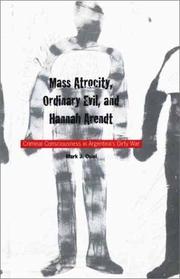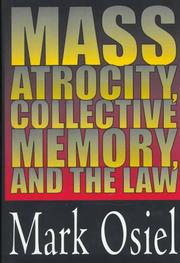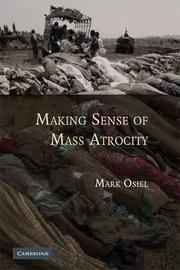| Listing 1 - 10 of 10 |
Sort by
|

ISBN: 0300087535 Year: 2001 Publisher: New Haven : Yale University Press,
Abstract | Keywords | Export | Availability | Bookmark
 Loading...
Loading...Choose an application
- Reference Manager
- EndNote
- RefWorks (Direct export to RefWorks)
Crimes against humanity. --- Criminal liability. --- Courts-martial and courts of inquiry --- Military offenses --- Disappeared persons --- Criminal liability --- Crimes contre l'humanité --- Responsabilité pénale --- Cours martiales et tribunaux d'enquête --- Délits militaires --- Personnes disparues --- History --- History. --- Histoire --- Military crimes --- Crimes contre l'humanité --- Responsabilité pénale --- Cours martiales et tribunaux d'enquête --- Délits militaires

ISBN: 1560003227 0765806630 9780765806635 9781560003229 9780203786154 9781351506663 9781138527720 Year: 2000 Publisher: New Brunswick, N.J. Transaction
Abstract | Keywords | Export | Availability | Bookmark
 Loading...
Loading...Choose an application
- Reference Manager
- EndNote
- RefWorks (Direct export to RefWorks)
Trials of those responsible for large-scale state brutality have captured public imagination in several countries. Prosecutors and judges in such cases, says Osiel, rightly aim to shape collective memory. They can do so in ways successful as public spectacle and consistent with liberal legality. In defending this interpretation, he examines the Nuremburg and Tokyo trials, the Eichmann prosecution, and more recent trials in Argentina and France. Such trials can never summon up a "collective conscience" of moral principles shared by all, he argues. But they can nonetheless contribute to a little-noticed kind of social solidarity. The approach Osiel advocates requires courts to confront questions of historical interpretation and moral pedagogy generally regarded as beyond their professional competence. It also raises objections that defendants' rights will be sacrificed, historical understanding distorted, and that the law cannot willfully influence collective memory, at least not when lawyers acknowledge this aim. Osiel responds to all these objections, and others. Lawyers, judges, sociologists, historians, and political theorists will find this a compelling contribution to debates on the meaning and consequences of genocide. To this end, writes Osiel, we should pay closer attention to the way an experience of administrative massacre is framed within the conventions of competing theatrical genres. Defense counsel will tell the story as a tragedy, while prosecutors will present it as a morality play. The judicial task at such moments is to employ the law to recast the courtroom drama in terms of a "theater of ideas," which engages large questions of collective memory and even national identity. Osiel asserts that principles of liberal morality can be most effectively inculcated in a society traumatized by fratricide when proceedings are conducted in this fashion.
Human rights --- Law of armed conflicts. Humanitarian law --- Collectieve verantwoordelijkheid. --- Ethische vorming. --- GENOCIDE. --- LAW. --- MORAL ASPECTS. --- Memoria --- Moraal. --- SOCIOLOGY. --- TRIALS. --- Tribunalen. --- WAR CRIMES. --- Genocide. --- HISTORY. --- Memory --- Twentieth century. --- War crime trials --- Aspectos sociales. --- Social aspects. --- Moral and ethical aspects.

ISBN: 9781107403185 9780521861854 9780511596575 Year: 2009 Publisher: Cambridge Cambridge University
Abstract | Keywords | Export | Availability | Bookmark
 Loading...
Loading...Choose an application
- Reference Manager
- EndNote
- RefWorks (Direct export to RefWorks)
Crimes against humanity. --- Criminal liability. --- Crimes contre l'humanité --- Responsabilité pénale --- Accountability, Criminal --- Criminal accountability --- Criminal responsibility --- Liability, Criminal --- Responsibility, Criminal --- Criminal liability (International law) --- International crimes --- Crimes, International --- International crime --- International offenses --- Crime --- International law
Book
ISBN: 9780674368255 Year: 2019 Publisher: Cambridge Harvard University Press
Abstract | Keywords | Export | Availability | Bookmark
 Loading...
Loading...Choose an application
- Reference Manager
- EndNote
- RefWorks (Direct export to RefWorks)
Political philosophy. Social philosophy --- General ethics --- Human rights
Book
ISBN: 1107189918 1282539248 9786612539244 0511817576 0511718918 0511719361 0511515200 0511718454 0511516487 9780511719363 9780511817571 9780521513517 9780521730143 0521513510 0521730147 9781107189911 9781282539242 6612539240 9780511718915 9780511515200 9780511718458 9780511516481 Year: 2009 Publisher: New York Cambridge University Press
Abstract | Keywords | Export | Availability | Bookmark
 Loading...
Loading...Choose an application
- Reference Manager
- EndNote
- RefWorks (Direct export to RefWorks)
Why should America restrain itself in detaining, interrogating, and targeting terrorists when they show it no similar forbearance? Is it fair to expect one side to fight by more stringent rules than the other, placing itself at disadvantage? Is the disadvantaged side then permitted to use the tactics and strategies of its opponent? If so, then America's most controversial counterterrorism practices are justified as commensurate responses to indiscriminate terror. Yet different ethical standards prove entirely fitting, the author finds, in a conflict between a network of suicidal terrorists seeking mass atrocity at any cost and a constitutional democracy committed to respecting human dignity and the rule of law. The most important reciprocity involves neither uniform application of fair rules nor their enforcement by a simple-minded tit-for-tat. Real reciprocity instead entails contributing to an emergent global contract that encompasses the law of war and from which all peoples may mutually benefit.
Humanitarian law. --- Terrorism --- Lex talionis. --- Reciprocity (Psychology) --- Interpersonal relations --- Retaliation (Law) --- Retribution (Law) --- Retributive justice --- Talion (Law) --- Revenge --- Vendetta --- War on Terrorism, 2001-2009 --- Humanitarian conventions --- International humanitarian law --- War (International law) --- Prevention --- Law and legislation. --- Law and legislation --- Reciprocity (Psychology). --- Law --- General and Others

ISBN: 0511699182 1107196604 1282303201 9786612303203 0511595778 051159657X 0511596170 0511593058 0511592124 0511594984 9780511596179 9780521861854 0521861853 9780511596575 9781107403185 1107403189 Year: 2009 Publisher: Cambridge New York Cambridge University Press
Abstract | Keywords | Export | Availability | Bookmark
 Loading...
Loading...Choose an application
- Reference Manager
- EndNote
- RefWorks (Direct export to RefWorks)
Genocide, crimes against humanity, and the worst war crimes are possible only when the state or other organisations mobilise and co-ordinate the efforts of many people. Responsibility for mass atrocity is always widely shared, often by thousands. Yet criminal law, with its liberal underpinnings, prefers to blame particular individuals for isolated acts. Is such law, therefore, constitutionally unable to make any sense of the most catastrophic conflagrations of our time? Drawing on the experience of several prosecutions, this book both trenchantly diagnoses the law's limits at such times and offers a spirited defence of its moral and intellectual resources for meeting the vexing challenge of holding anyone criminally accountable for mass atrocity. Just as war criminals develop new methods of eluding law's historic grasp, so criminal law flexibly devises novel responses to their stratagems. Mark Osiel examines several such legal innovations in international jurisprudence and proposes still others.
Crimes against humanity. --- Criminal liability. --- Accountability, Criminal --- Criminal accountability --- Criminal liability --- Criminal responsibility --- Liability, Criminal --- Responsibility, Criminal --- Liability (Law) --- Crime --- International crimes --- Genocide --- War crimes --- Law and legislation --- International crimes. --- Criminal liability (International law) --- International law --- Crimes, International --- International crime --- International offenses --- Law --- General and Others
Book
ISBN: 0674240200 0674240197 Year: 2019 Publisher: Cambridge, MA : Harvard University Press,
Abstract | Keywords | Export | Availability | Bookmark
 Loading...
Loading...Choose an application
- Reference Manager
- EndNote
- RefWorks (Direct export to RefWorks)
Much of what we could do, we shouldn't-and we don't. Mark Osiel shows that common morality-expressed as shame, outrage, and stigma-is society's first line of defense against transgressions. Social norms can be indefensible, but when they complement the law, they can save us from an alternative that is far worse: a repressive legal regime.
Law and ethics. --- Ethics and law --- Law and morals --- Morals and law --- Law --- Philosophy
Book
Year: 2000 Publisher: New Brunswick, N. J. London Transaction Publishers
Abstract | Keywords | Export | Availability | Bookmark
 Loading...
Loading...Choose an application
- Reference Manager
- EndNote
- RefWorks (Direct export to RefWorks)
Book
ISBN: 9780674240193 0674240197 9780674368255 0674368258 Year: 2019 Publisher: Cambridge, Mass. Harvard University Press
Abstract | Keywords | Export | Availability | Bookmark
 Loading...
Loading...Choose an application
- Reference Manager
- EndNote
- RefWorks (Direct export to RefWorks)
Political philosophy. Social philosophy --- General ethics --- Human rights
Book
ISBN: 2020481243 9782020481243 Year: 2006 Publisher: Paris : Editions du Seuil,
Abstract | Keywords | Export | Availability | Bookmark
 Loading...
Loading...Choose an application
- Reference Manager
- EndNote
- RefWorks (Direct export to RefWorks)
Mass media and criminal justice --- Memory --- International crimes --- Sociological jurisprudence --- Collective memory --- War crimes --- Crimes against humanity --- Médias et justice pénale --- Mémoire --- Droit international pénal --- Sociologie juridique --- Mémoire collective --- Crimes de guerre --- Crimes contre l'humanité --- Social aspects --- Aspect social --- Médias et justice pénale --- Mémoire --- Droit international pénal --- Mémoire collective --- Crimes contre l'humanité
| Listing 1 - 10 of 10 |
Sort by
|

 Search
Search Feedback
Feedback About UniCat
About UniCat  Help
Help News
News